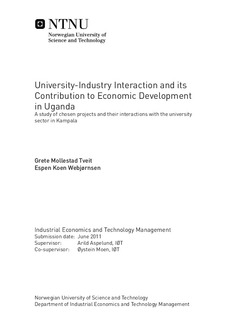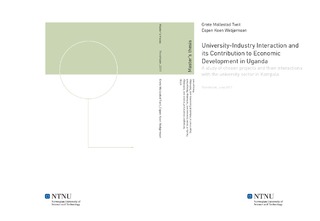| dc.contributor.advisor | Aspelund, Arild | nb_NO |
| dc.contributor.advisor | Moen, Øystein | nb_NO |
| dc.contributor.author | Tveit, Grete Mollestad | nb_NO |
| dc.contributor.author | Webjørnsen, Espen Koen | nb_NO |
| dc.date.accessioned | 2014-12-19T14:27:36Z | |
| dc.date.available | 2014-12-19T14:27:36Z | |
| dc.date.created | 2012-01-06 | nb_NO |
| dc.date.issued | 2011 | nb_NO |
| dc.identifier | 473565 | nb_NO |
| dc.identifier | ntnudaim:6030 | nb_NO |
| dc.identifier.uri | http://hdl.handle.net/11250/265890 | |
| dc.description.abstract | The Triple Helix model promotes interaction between the government, universities and industry through free flow of information. The model is created with a closed system in mind. Free flow of information is illustrated by local interaction, without mention of external influence from e.g. global companies or donor organizations. In developing countries these actors play an important role and may influence the local Triple Helix. This influence is the basis for the main research question of this study.Research was conducted through a case study of Uganda and its hydropower sector. Relevant actors within the sector were interviewed in accordance to three sub questions on University-Industry collaboration. Through a thematic analysis of these semi-structured interviews, empirical results are presented. There is little UI-collaboration within hydropower in Uganda. The foreign actors within this sector wish to collaborate with the university, but request a national framework. A number of challenges to UI-collaboration in Uganda are revealed, which can be generalized as problems of all developing countries, i.e. lack of capital, weak institutions and lack of initiative to more collaboration.It is argued that foreign industry benefit from local knowledge and supports the local Triple Helix interactions. In the university, there is a need for a catalyst to initiate changes to enable increased UI-collaboration. Neither the government nor the industry is able to take this role. Donors are identified as important actors in developing countries and suggested as a catalyst. However, the study finds donors way of working to be slowing down the development in developing countries. This calls for a change in donor support, and further research to validate such change is suggested.It is concluded that the open system influence of donors, foreign industry and other similar institutions influence the Triple Helix interactions in developing countries. The model is still valid, as the external influence is supportive of local institutional interactions. To better illustrate the situation in developing countries, The Open Triple Helix model is introduced, which includes external actors as an influence to the Triple Helix model in developing countries. | nb_NO |
| dc.language | eng | nb_NO |
| dc.publisher | Institutt for industriell økonomi og teknologiledelse | nb_NO |
| dc.subject | ntnudaim:6030 | no_NO |
| dc.subject | MTIØT Industriell økonomi og teknologiledelse | no_NO |
| dc.subject | Strategi og internasjonal forretnmingsutvikling | no_NO |
| dc.title | University-Industry Interaction and its Contribution to Economic Development in Uganda: A study of chosen projects and their interactions with the university sector in Kampala | nb_NO |
| dc.type | Master thesis | nb_NO |
| dc.source.pagenumber | 80 | nb_NO |
| dc.contributor.department | Norges teknisk-naturvitenskapelige universitet, Fakultet for samfunnsvitenskap og teknologiledelse, Institutt for industriell økonomi og teknologiledelse | nb_NO |

